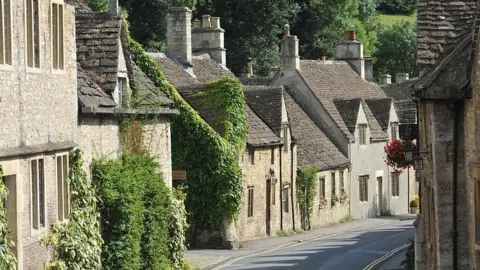Holiday lets register considered amid concern over affordable homes
 BBC
BBCThe government is to look at setting up a holiday lets register for England, amid concern that a lack of affordable homes is destroying communities.
It promised a consultation starting later this year would also study the effect of websites like Airbnb.
During a Commons debate, MPs from several parties said holiday lets and second home ownership were surging.
Lib Dem Tim Farron demanded more help for local people priced out of the housing market.
A consultation on a Tourist Accommodation Registration Scheme - to gather data on the economic and social benefits and downsides of short-term holiday rentals - was first promised in June last year.
Mr Farron, MP for Westmorland and Lonsdale, Cumbria, said the government needed to show more urgency and that such an inquiry was likely to "take years, because they always do".
During a Westminster Hall debate, he said the desire to buy second homes during the pandemic and the ease with which people can now advertise holiday lets online had pushed up prices and left many villages and towns largely empty for much of the year.
"A bad situation has become entirely disastrous," he said, adding that the cost of an average home in his constituency, which includes parts of the Lake District and Yorkshire Dales, was now around 11 times the average wage.
One in seven properties were now second homes, he added.
The government admits it only has a limited picture of how many properties across England are second homes and holiday lets.
But during the debate, several MPs told similar stories to Mr Farron's, with Conservative Bob Seely, who represents the Isle of Wight, saying that 82% of residential properties in the village of Seaview were now second homes.
Rachael Maskell, the Labour MP for York, said the average property price in the city was 8.3 times the average wage.
And Conservative Selaine Saxby said much of North Devon, which she represents, had become a "complete ghost coast".
In the town of Barnstaple, only two properties were currently listed for long-term rentals, while 123 were available on Airbnb, she added.

'People from down south are buying everything up'

"I lived in a lovely rental property just outside of Bowness (in Cumbria)," says 52-year-old bar manager Debbie Lumsden. "Out of the blue the landlord gave us four months' notice as he was selling it to probably go as a holiday let or second home.
"I had to scramble to find somewhere to live and there was no available rental properties in the area at all. It was looking like I had to leave the area completely, as well as my job."
Debbie says that "at the 11th hour" a friend helped her find a flat elsewhere, but adds that there is a need for a change in the rules to cut the level of second home ownership and holiday lets.
"Every single business in the area suffers greatly from lack of staff and you can't entice people to come to the area because there's no affordable rental properties.
"Everything's been bought by people from down south and turned into holiday lets."

Mr Farron, who called the debate, urged the government to adopt measures including creating a separate planning category for turning homes into holiday lets.
He also called for council tax to be doubled for second homes in some of the worst affected areas, where local people could no longer afford to live, creating labour shortages and damaging services such as schools and shops.
In response, housing minister Chris Pincher promised to look at Mr Farron's ideas.
He also promised the government would consult on introducing the tourist registration scheme, "so we can build our understanding of the evidence and issues that second homes present, particularly driven by the rise of online platforms such as Airbnb".
"We recognise a large number of second homes and holiday lets can have adverse effects," he said, but added that tourism was a significant part of local economies in many parts of England and the freedom of home owners to use their properties as they wished had to be respected.
